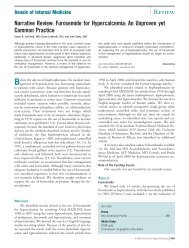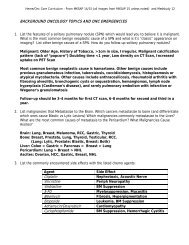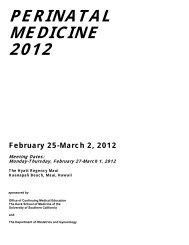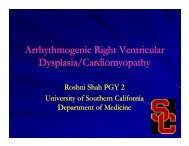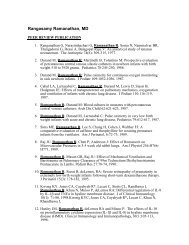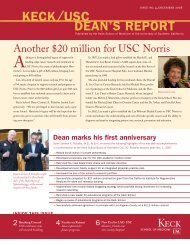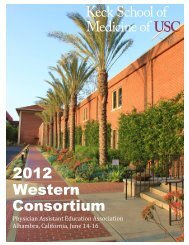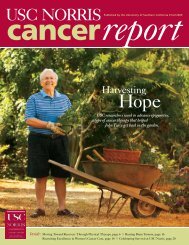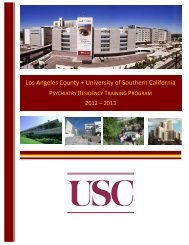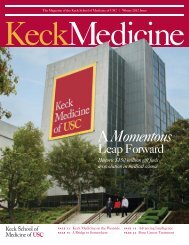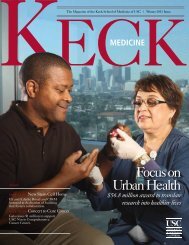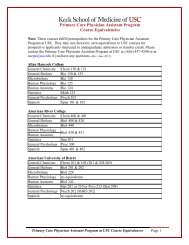Program Book - Keck School of Medicine of USC - University of ...
Program Book - Keck School of Medicine of USC - University of ...
Program Book - Keck School of Medicine of USC - University of ...
- No tags were found...
You also want an ePaper? Increase the reach of your titles
YUMPU automatically turns print PDFs into web optimized ePapers that Google loves.
POLICY ON CULTURAL AND LINGUISTIC COMPETENCE 2011‐12<strong>Keck</strong> <strong>School</strong> <strong>of</strong> <strong>Medicine</strong> <strong>of</strong> <strong>USC</strong>Office <strong>of</strong> Continuing Medical EducationPOLICY ON CULTURAL AND LINGUISTIC COMPETENCYIN CONTINUING MEDICAL EDUCATIONThe Accreditation Council <strong>of</strong> Continuing Medical Education (ACCME) expects accredited providersto operate business and management policies and procedures <strong>of</strong> their CME program so that theirobligations and commitments are met. As part <strong>of</strong> this accreditation requirement, the ACCMEexpects that accredited providers located in California will be in compliance with all applicableCalifornia state laws regarding continuing medical education delivered in California, including CAA.B. 1195, enacted in 2005.In accordance with A.B. 1195, the <strong>Keck</strong> <strong>School</strong> <strong>of</strong> <strong>Medicine</strong> <strong>of</strong> the <strong>University</strong> <strong>of</strong> Southern CaliforniaOffice <strong>of</strong> Continuing Medical Education has adopted a policy <strong>of</strong> incorporating cultural and linguisticcompetency in the formulation and planning <strong>of</strong> Continuing Medical Education (CME) courses inorder to maintain, develop, or increase the knowledge, skills, and pr<strong>of</strong>essional performance that aphysician uses to provide care, or improve the quality <strong>of</strong> care provided for patients.These educational activities should include, but are not limited to, any <strong>of</strong> the following criteria:1. Have a scientific or clinical content with a direct bearing on the quality or cost-effectiveprovision <strong>of</strong> patient care, community or public health, or preventive medicine;2. Concern quality assurance or improvement, risk management, health facility standards, or thelegal aspects <strong>of</strong> clinical medicine;3. Concern bioethics or pr<strong>of</strong>essional ethics;4. Are designed to improve the physician-patient relationship.A.B. 1195 has provided three ways to comply with the law:1. Cultural competency is defined as a set <strong>of</strong> integrated attitudes, knowledge, and skills thatenables a health care pr<strong>of</strong>essional to care effectively for patients from diverse cultures,groups, and communities. Items to be addressed include linguistic skills, cultural informationto establish therapeutic relationships, cultural data in diagnosis and treatment, and culturaland ethnic data applying to the process <strong>of</strong> clinical care. To comply with the culturalcompetency requirement, an activity should include the following:a. applying linguistic skills to communicate effectively with the target population;b. utilizing cultural information to establish therapeutic relationships;c. eliciting and incorporating pertinent cultural data in diagnosis and treatment;d. understanding and applying cultural and ethnic data to the process <strong>of</strong> clinical care.2. Linguistic competency is defined as the ability <strong>of</strong> a physician to provide patients who do notspeak English or who have limited ability to speak English with direct communication in thepatient’s primary language. To comply with the linguistic competency requirement, an1149



